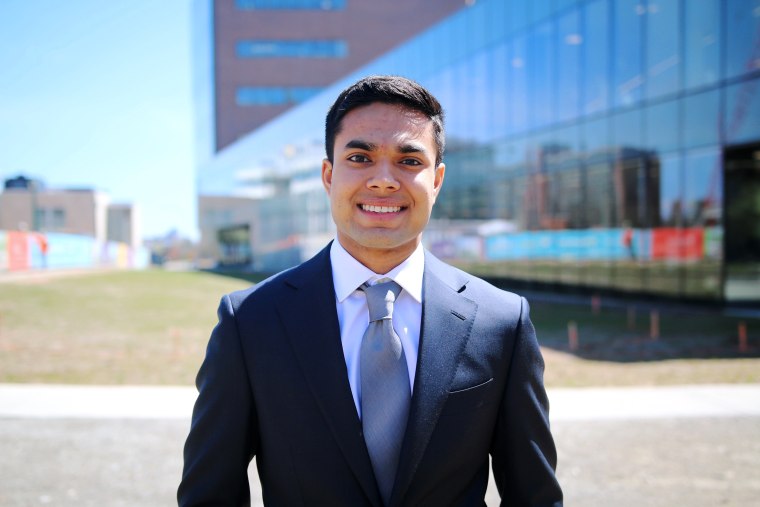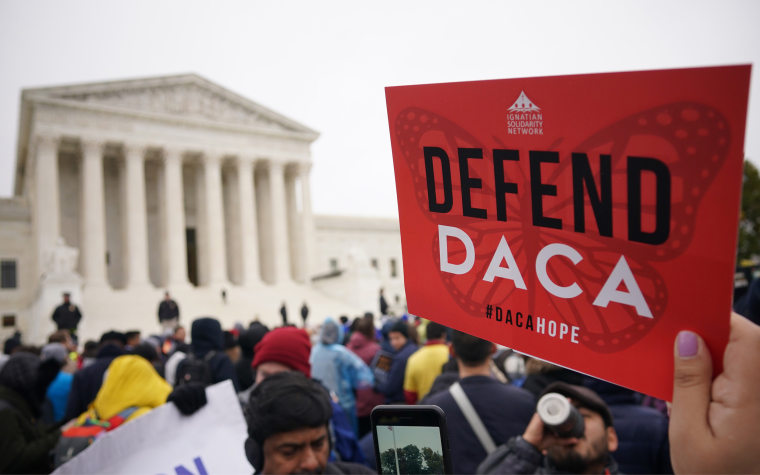As an inpatient hospital pharmacist, I am part of a health care team providing lifesaving treatments to Covid-19 patients. It's hard work, but I love being a part of easing patients' suffering and restoring their health. I am honored to be an essential health care worker in this country at this time.
I’m one of an estimated 200,000-plus “documented Dreamers” — a little-known group of young immigrants who live here legally but at age 21 must “self-deport."
And yet, unless the new Biden administration and Congress take action, my ability to do this work could be short-lived. I'm one of an estimated 200,000-plus "documented Dreamers," a little-known group of young immigrants who live here legally but at age 21 must "self-deport" — that is, leave the country on our own to prevent violating immigration law, unless we find temporary ways to stay.
Much like the Dreamers who have been at the center of the debate over Deferred Action for Childhood Arrivals, documented Dreamers like me were brought to the U.S. by our parents when we were children. We grew up in the American school system, and many of us know no other home.
We are different from undocumented Dreamers, however, in that our parents have maintained legal status in the country, typically as small-business owners or highly skilled workers. Their visas either don't provide pathways to citizenship or have long waits for green cards, without which they can't confer ongoing status to their children.
And so, if our parents haven't managed to secure permanent residence by the time we turn 21, we must self-deport even though they are allowed to stay. In contrast, DACA recipients qualify for work authorization and may remain in the U.S. so long as they apply for two-year extensions. In addition, if the proposed American Dream and Promise Act passed by the House last year becomes law, DACA recipients and others who grew up in the United States as children in an undocumented status will get a clear pathway to citizenship.
Nonsensically, these programs protecting immigrants brought here as children all require some breach of immigration laws, whether that's arriving undocumented or overstaying a visa. That means those of us who grew up here legally are ineligible because our parents followed the rules and maintained their legal status.

This is why I founded ImproveTheDream.org, an organization that advocates for an inclusive Dreamer solution. The DACA program is welcome, and it needs to be made permanent, but future proposals for Dreamers must include those of us who meet every criterion except the absurd "requirement" of being here without legal status. America courted our parents because it wanted their skills and economic contributions. In doing so, this country helped raise us, educating us in American schools and steeping us in American culture.
Though I was born in India, my family and I are Canadian citizens who moved to the U.S. on an E-2 treaty investor visa over 15 years ago. I was still in elementary school when we settled in southern Illinois to open a convenience store in which we employed American workers and became invested in our community.
I grew up as American as my neighbors, participating in school clubs and playing baseball, soccer and tennis. Upon turning 21, I had to give up my E-2 status, however, and switch to an international student visa. After graduating with a doctor of pharmacy degree, I started working at a suburban Chicago hospital under the Optional Practical Training program, which thankfully gives one year of work authorization to international students.
When that ended this summer, I was fortunate to find a way to stay for three years based on my Canadian citizenship, a provision that is renewable for certain occupations. But a gap in employment or an employer unwilling to support my temporary status could force me to leave the country I have called home for 15 years.
No matter how long I eventually live and work here, because of obstacles under current immigration law, I have no clear path to citizenship. I will always have to find temporary status and, unless I marry a U.S. citizen, will face deportation if I fail to secure it.
Moreover, documented Dreamers without the advantages of Canadian citizenship — which is most of them — often fail to find authorization to stay and must self-deport.
This system isn't only stressful and cruel; it's also bad for the economy. The Cato Institute estimates the net economic cost of losing documented Dreamers, almost all of whom have been educated in taxpayer-funded schools, to be over $30 billion. The documented Dreamers I represent fill critical gaps in health care, technology, agriculture and service industries that are struggling to grow because they can't find workers, even during the recession.
Throughout his campaign, Joe Biden promised to reinstate DACA and create a pathway for citizenship for 2 million Dreamers. Now that he is president-elect, I urge his administration and Congress to ensure that these policies include documented Dreamers like me. All children, undocumented or documented, who grew up in the U.S. should have a clear path to citizenship.



